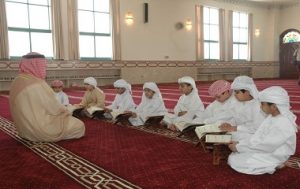The literal meaning of tafsir in the Arabic language is to open or to explain, interpret or comment. Technically, the science of tafsir is a branch of knowledge in which the meanings of the Quran are explained and its injunctions and wisdoms are described openly and clearly (al-Burhan). Addressing the Holy Prophet, the Glorious Quran says: “We revealed the Quran to you so that you explain to the people what has been sent down to them.” (16:44) The Holy Quran also says: “Surely, Allah did a great favor to Muslims when He sent a Messenger to them from among them who would recite His verses before them and purify them and teach them the Book and the Wisdom”. (3:164) Keeping this in view, it should be noted that the Holy Prophet not only taught the words of the Quran to the people but he also explained them in detail. This is why, on some occasions, the revered Companions had to devote years at a time to learning a single surah. Until such time that the Holy Prophet graced the mortal world with his presence, seeking the explanation of a Quranic verse did not pose much of a problem. When the Companions faced any difficulty in understanding a verse, they would simply turn to the Prophet (upon him blessings and peace). Later, however, it became necessary that the tafsir of the Quran be preserved as a permanent branch of knowledge so that, along with the words of the Noble Quran, its correct meaning remain protected and conserved for the Muslim Ummah as well, and so heretics and deviants could find no room for distortion of its meanings. So, with the grace and tawfiq of Allah Almighty, the Ummah accomplished this wonderful mission with such efficiency that today we can say without any doubt or fear of rebuttal that not only have the words of this Last Book of Allah been protected but also its correct explanation transmitted to us through the Holy Prophet and his Companions. In what ways did the Muslim Ummah protect and preserve the science? What extreme hardships did they face in its pursuit? How many stages did this struggle encompass? All this has a long and fascinating history which cannot be taken up in the present context. The intention here is to mention briefly the sources of Quranic exegesis and how these sources have been utilized in explaining the Noble Quran by the countless books on tafsir available in countless languages. The sources of Quranic exegesis are six: 1. Quran: The first source of the knowledge of tafsir is the Quran itself. Accordingly, it happens very often that a certain point which is brief and requires explanation is invariably clarified by some other verse of the Quran. For instance, in the following verse of Surat al-Fatihah, “Guide us on the straight path, the path of those on whom You have blessed…”, it is not clear here as to who are those whom Allah Almighty has blessed. But, in another verse, they have been identified very clearly where it is said: “So, these are the people whom Allah Almighty has blessed, being the prophets, their true followers, the martyrs (in the way of Allah) and the righteous.” (4:69) Therefore, when commentators explain a Quranic verse, they first check to see if a tafsir of the verse is already existent elsewhere in the Quran itself. If such an explanatory verse exists, they elect to adhere to it as their first choice. 2. Hadith: The words and the deeds of the Holy Prophet (upon him blessings and peace) are called hadith, and as it has been stated earlier, Allah Almighty sent him with the Quran solely for the purpose of explaining, openly and explicitly, the correct meanings of the Quran to people. Consequently, he discharged this duty with grace and excellence both by word and deed. In fact, his whole blessed life is, after all, a practical tafsir of Quran. It is for this reason that respected commentators, in order to understand the Quran, have laid the greatest emphasis on the hadith as the second source of tafsir and it is in the light of hadiths that they have determined the meanings of the Book of Allah. However, because all sorts of narrations – sound, weak, and fabricated – are included in hadith, research-oriented commentators do not accept a narration as trustworthy until it withstands the principles used in the scrutiny of hadith narrations. Hence, simply finding a hadith report somewhere and then employing it as a source of Quranic commentary is not correct because of the very likely possibility that the report is weak or even contradictory to stronger reports. Without a doubt, hadith verification and criticism is a delicate matter and venturing therein is the exclusive prerogative of those who have spent years in mastering this field of knowledge. 3. Narrations of Companions: The noble Sahabah, or Companions (may Allah be pleased with them all), had received their education directly from the Holy Prophet (upon him blessings and peace). In addition, they were personally present on the scene when verses were revealed, and they had themselves witnessed the circumstances and backgrounds of the Quranic revelation. Therefore, naturally, the recorded statements of these blessed souls are far more authentic and trustworthy in explaining the Noble Quran. Hence, in the case of verses the explanation of which is not found in the Quran or Hadith, statements recorded from the noble Companions (may Allah be pleased with them) are given the highest priority. Consequently, if there is a consensus of Companions on the explanation of a certain verse, the commentators follow just that and explaining it in any way otherwise is not considered permissible. If the statements of Companions (may Allah be pleased with them) differ in the interpretation (tafsir) of a certain verse, then the commentators who come later examine them in the light of various proofs and arguments and then determine which interpretation or explanation should be





